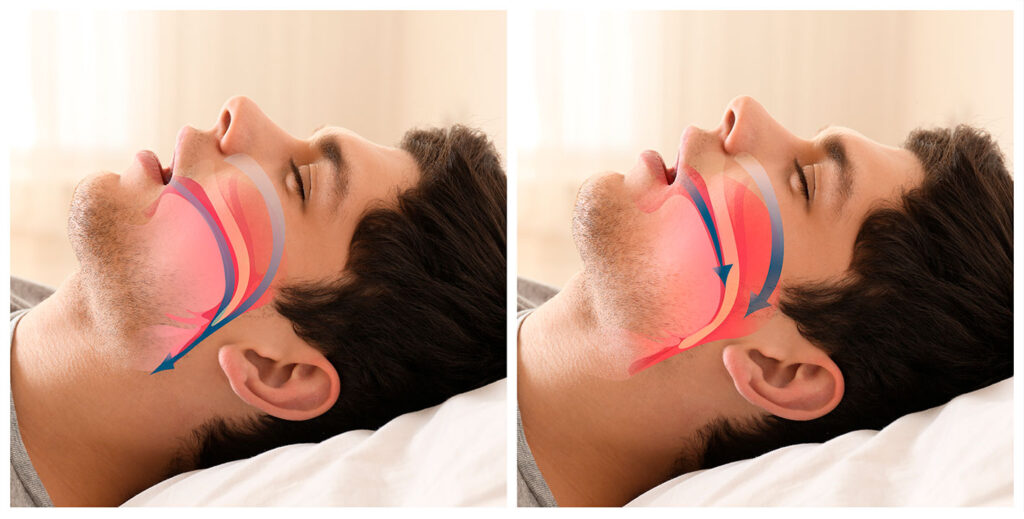Snoring is an annoying hoarse, dull noise produced in the nose and throat during sleep.
It is a fairly common phenomenon that tends to increase with aging and that affects about 57% of men and 43% of women.
Both in terms of quantitative (intensity) and qualitative (type and duration) aspects, snoring is extremely subjective and can also vary in the same person depending on his state of health, the type of meal consumed and the conditions of his psychoemotional sphere.
These problems, which afflict not only the person who snores, but also those who sleep next to them, they can also interfere with breathing which is obviously damaged during the night.
As a consequence it can trigger a lack of oxygen in the brain responsible for the sudden awakenings typical of the snorer.
Those affected by this disorder never manage to rest effectively and upon awakening he presents drowsiness, drowsiness and often an inability to concentrate.
The inconveniences deriving from this situation considerably affect the quality of life, also of those who share the same room, thus confirming themselves as predisposing factors to numerous psychological disorders.
The fact that snoring is an action that occurs only during sleep, suggests that it is connected to muscle relaxation that occurs during the night, in fact this condition contributes to decrease the rigidity of the palatine tissue making it more subject to vibrations, which are the cause of the problem.

Causes of snoring
The main cause is related to the amount of air that passes through the throat during sleep breathing.
When anomalous eddies of this gaseous fluid are created the membranes of the soft palate vibrate excessively causing sound waves responsible for snoring.
Obstructive apnea is also very often established, resulting from the abnormal vibration of the soft parts of the throat.
People who suffer from these two disorders at the same time can never sleep continuously for one nightand whole, but they interrupt sleep about every one or two hours.
They also tend to hold their breath and frequently experience a choking sensation.
Disorders of this kind are more common in people over fifty who are overweight, who habitually consume alcoholic beverages, or who have anatomical malformations of the nasal septum.
The most typical symptoms of snoring are linked to poor sleep quality, which usually presupposes the onset of morning headaches, hypertensive crises, drowsiness during the day and difficulty in applying it to any type of work activity.
This is a phenomenon that can vary over time, both for the worse and for the better, probably due to the different lifestyle of the subject, in fact, going to bed after a light and not very abundant meal, snorers are more likely to sleep peacefully.
The body mass index is also a factor that considerably affects people who snore and therefore should be contained within its standard value.
A visit to the ENT specialist is often recommended to detect if there are anatomical defects of the nasal septum or soft palate.

According to the majority of scientific opinions, people who snore should sleep with their torso raised slightly to facilitate breathing.
For this purpose it would be advisable to use motorized orthopedic bases able to raise the upper part of the bed, allowing the subject to sleep in a position that is not completely horizontal.
Besides this device is also recommended to use orthopedic pillows specially designed to keep the head up at night.
There are latest generation products on the market including mattress sets and pillows, ideal for this type of disorder.
These are supports made with special materials whose role is to support the body without any forcing, but respecting its anatomical conformation.
They also support the upper part of the bust (including the neck and head), with an angle designed to facilitate breathing during sleep without any strain on the spine.
It has been seen that by using adequate devices such as motorized bed base, orthopedic mattress and pillow, even those at risk of obstructive sleep apnea show a marked improvement.
Depending on individual needs, it is possible to calibrate both the height of the bed base and the height of the orthopedic pillows, taking into account that during the night snoring episodes can increase or decrease their frequency and therefore require different anatomical support.
Finally, it must be borne in mind that i constituent materials of these products guarantee a perfect thermoregulation of the body, avoiding accumulations of heat that could increase the respiratory rate and therefore snoring.
The thermal factor is in fact one of the contributing causes of this problem, which manifests itself more intensely in overheated environments or where adequate air exchange is not possible.

